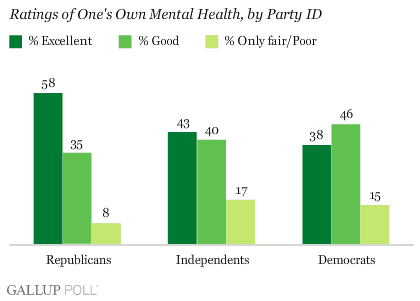A Gallup poll of over 4000 Americans indicates that Republicans have significantly better mental health than their Democratic counterparts.

Various statistical perspectives are graphed as well, all showing Republicans as being significantly healthier. Gallup’s key conclusions:
Previous analysis (see Related Items) shows that a number of variables are related to self-reported mental health — including, in particular, income. Because Republicans have on average higher incomes than independents or Democrats, part of the explanation for the relationship between being a Republican and having better mental health is a result of this underlying factor. The same is true for several other variables.
But the key finding of the analyses presented here is that being a Republican appears to have an independent relationship on positive mental health above and beyond what can be explained by these types of demographic and lifestyle variables. The exact explanation for this persistent relationship — as noted — is unclear.
So what does this mean exactly?
Correlation is no proof of causation, of course. The reason the relationship exists between being a Republican and more positive mental health is unknown, and one cannot say whether something about being a Republican causes a person to be more mentally healthy, or whether something about being mentally healthy causes a person to choose to become a Republican (or whether some third variable is responsible for causing both to be parallel).
In a way I’m surprised. At first blush I wouldn’t have expected such a large gap between Republicans and Democrats. But I have an idea what’s behind it.
On average Republicans are more conservative than Democrats, obviously, and to me that’s a significant factor. After all, it must be quite emotionally taxing to fervently believe in illogical causes like bans on animal fur coats, nuclear power, and the death penalty while supporting unrestricted access to abortion, illegal immigration, and wealth redistribution.
Ironically, it’s not hard to believe in these ideas – at first. After all, who wouldn’t want to feel good about themselves and live in harmony with others and nature while having everything we need provided for us through the efforts of others? Sadly, such an idyllic state of existence is not sustainable and I think many liberals subconsciously realize this even as they stridently push the anti-establishment, anti-religion, anti-freedom agenda they love so much on the rest of us.
Yet the truth catches up to them in the end. I’d suggest that the mental health issues the Gallup poll hints at manifest themselves in liberals over time as they live with the subtle tension caused by the contradictions between the purity of the unrealized, untenable, and unattainable objectives that are critical to their ideology and the harsh, inescapable reality that liberalism’s central ideal of moral relativity is utterly wrong, that there are absolutes in the world, and that their intellect is insufficient to understand to the truth that surrounds them.
Disappointments, following after the failure of grand dreams that, unknown to the architect, were built on a faulty foundation, must inevitably take their toll.